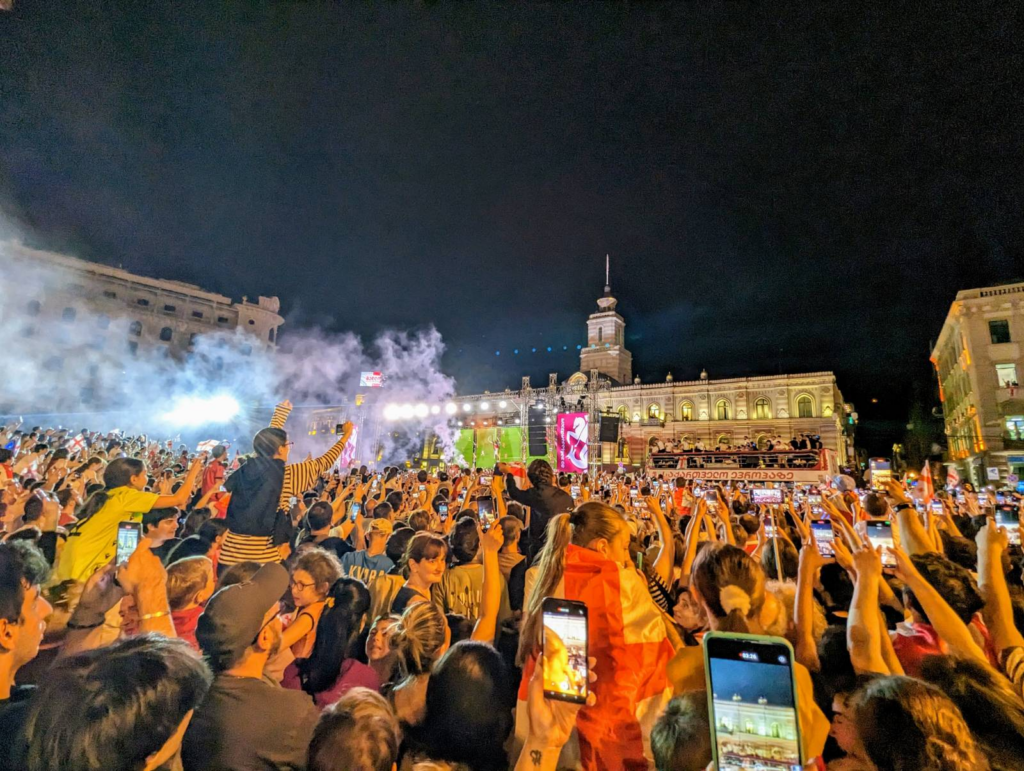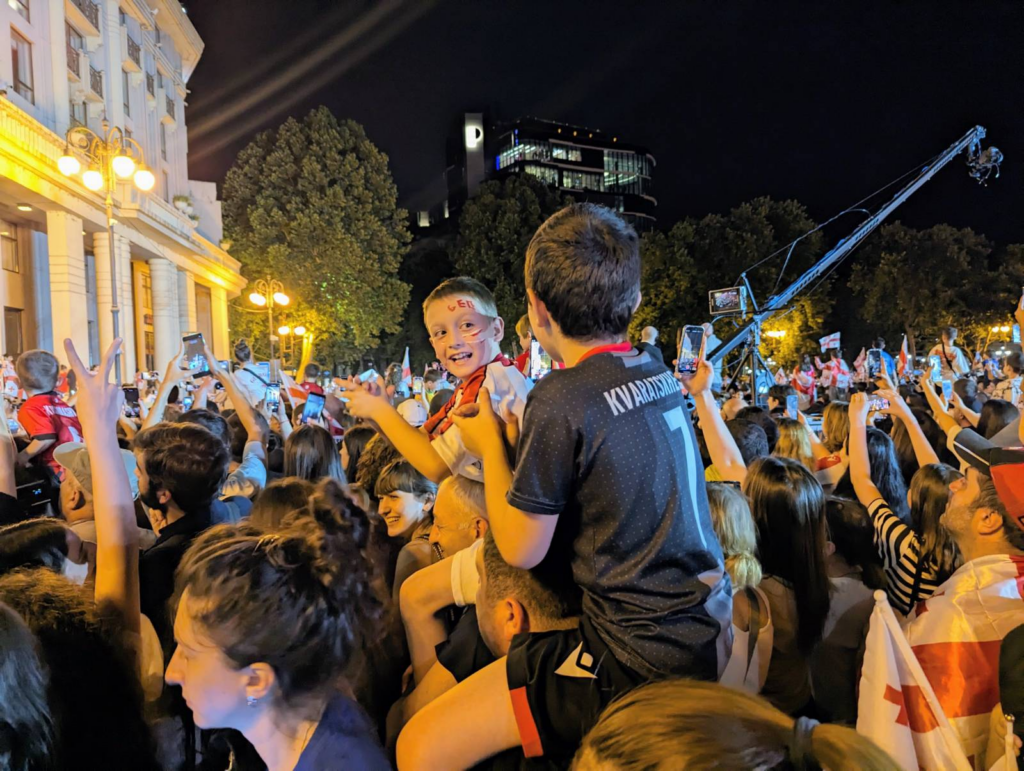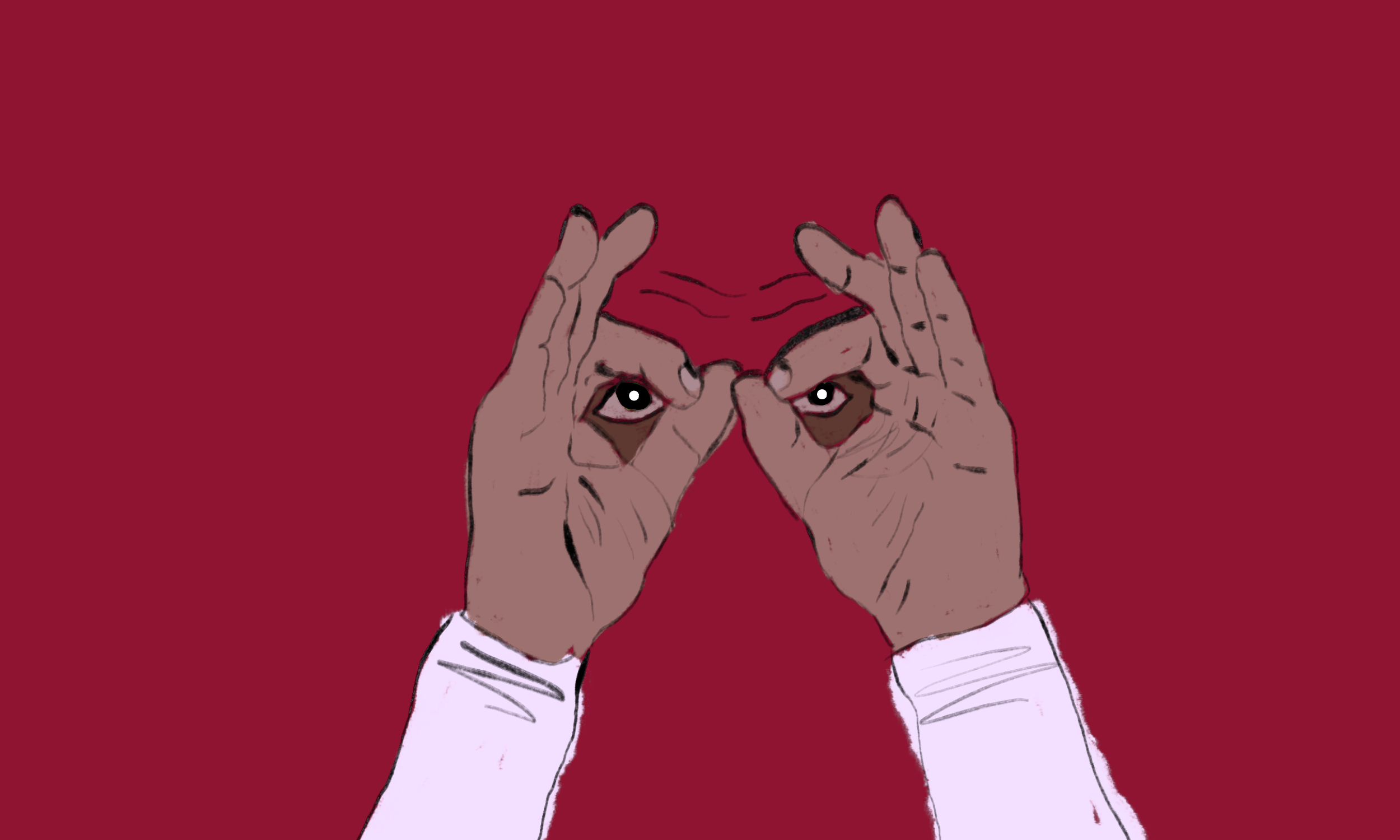Dispatch – July 3: Now You See Me
It was around 1 a.m. on July 1 when large crowds quietly poured into the streets of Tbilisi – an unusual occurrence for a Monday morning. There was no noise, only faint murmurs exchanged with weary looks. Slowly, cars started to move, and slowly, their horns began to break the silence of the night. National flags now appeared from open car windows, followed by the heads of passengers who had something to say but were still searching for the right words. Then finally, one young man found it: “Ara Ushaaavs!” – waving the flag, he cried out from the window the Georgian phrase for “it’s okay/never mind”, and everyone knew what he meant.
Minutes earlier, the Georgian national football team suffered a heartwrenching 4-1 defeat to Spain, ending its fairytale debut journey at EURO2024 after captivating international audiences, dominating various group stage rankings, and miraculously making it to the knockout stage. The loss to the championship favorites was expected but no less disappointing, especially since Georgia was the one to open the score.
Still, the honking of horns and the chants of fans that night grew louder, mixed with the sounds of fireworks, and the country realized that the end of the miracle still only meant one thing: the miracle had happened.
Here is Nini and the Dispatch newsletter, promising that this will be our last column on football this summer… well, probably.
Georgians play football the way Georgians live: always on the defensive, always fending off more powerful attackers, always in an unequal battle, but still waiting for a small chance, a tiny piece of freedom to show their best talents. Has it always been like this? Yes and no. Growing up in Georgia in the 1990s and 2000s, everyone loved to play football, anywhere from village fields to city streets, and everyone loved it when it was done beautifully: if you wanted to be the neighborhood favorite, you were expected to be a good dribbler. Just trust your author, who was there herself, passionate about kicking the ball, but apparently born with the wrong sex for those times. Yet it wasn’t just me who was restricted from being her own person back then – it was everyone.
It was a time when the country was recovering from seven decades of Soviet rule, followed by years of turmoil and civil war. To be yourself meant to be either a victim or, worse, an aggressor. Succumbing to trauma and economic hardship, some simply stopped trying. Others tried too hard – to be better, to break through the confines of geography and reach out to the wider world, a longing that has kept Georgians awake at night and left the outsiders struggling to make sense of. But this urge to be accepted by the outside world – especially the West – also brought confusion about what to give up and what to keep. The confusion was widespread, creating creative blockages in everything from the arts to sports, from politics to communications.

And that confusion may have been one of many things that have plagued Georgian football over the years: for decades, the constant disappointments led many of us to believe that football, quite simply, was not our thing. (The popular riff “Rugby is Our Game”, for example, implied that football, apparently, was not. In rugby, at least, Georgians were thriving and winning.)
The memories of older fans claiming to have witnessed the nation’s football prowess didn’t help. Still, it was hard to let go: what better way to reinvent yourself globally than through the most popular team sport that combines athleticism, creativity, and intelligence? The desire was there, and it was only a matter of time before the missing pieces came together: confidence, the readiness to set long-term goals, and the ability to play as a team. And as we would later find out, it wasn’t just our lack of effort – the world outside was not the fairest place to live, either.
‘Freedom is My Signature’
Things started to change when Georgian player Khvicha Kvaratskhelia joined Italy’s Serie A club Napoli and became the league’s best player in his debut season. It was, however, not his goals or assists that had the whole of Georgia glued to the screens; rather, the way he played and dribbled brought back football as we knew it. “Freedom is my signature,” he would later tell the New York Times. That freedom was also what won him an international following, but more importantly, it inspired Georgians – in and out of sports – that they could add hard work to their personality and still make it.
But Kvaratskhelia’s case also confirmed that luck is another key factor when you come from a country like Georgia. “He’s just a Georgian, he’s not Brazilian. It’s less glamorous,” Georgia’s head coach Willy Sagnol once quoted skeptical foreign football officials who’d refuse Kvaratskhelia’s European transfers.
The change also came as people in other areas slowly began to let go of their constraints and return to their old selves – partly as past traumas began to heal and partly as increased interaction with the outside world helped Georgians see themselves more clearly. Younger people began to boldly rediscover forgotten gems of their country’s culture. This, in turn, inspired more unique forms of self-expression that started to make a difference in social and political life.
This year’s football success was the best illustration – and culmination – of all these changes. The national team’s style of play showed that you can take this game of self-expression even further, and learn to show your character not only in those short counter-attacks but also in protracted periods of self-defense. The insane stretches of goalkeeper Giorgi Mamardashvili proved that you can be permanently besieged, tormented, and still be able to fly. The great support and cheers that Georgia received from its Caucasian neighbors meant that the struggle was not ours alone. And while ruling party propagandists tried to link this reinvention to their illiberal “sovereignty” discourse, the real lessons could be the opposite: that you can perfectly be yourself without preventing others from being themselves, be out there and contribute, not lose.

I’m Seen, Therefore I Am
The days between Euro 2024 matches were happy ones. Everywhere you went – on the street, in the office, on public transport – all you saw were beaming faces staring at phone screens. That’s what you do too: you see the social media post of a popular international platform praising Georgia’s performance; you instinctively rush to the comments section and check out foreign reactions, but you don’t stand a chance: your entire country is already there, including dozens of your Facebook friends who got there before you, left a few unsolicited national flag emojis, and reminded aspiring social media managers that whenever you need engagement, you call us, Georgians. Then you move on to the next football post the Facebook algorithm has ready for you, and then to the next: there’s nothing else on your newsfeed these days anyway.
Are we overdoing it? Is this obsession for international attention just an expression of underlying inhibitions and unfulfilled ambitions? Who even gives their team a heroes’ welcome simply because they made it to the knockouts? At first glance, it might indeed appear as too much. Yet in reality, what Georgia and Georgian fans want is something very natural, simple, and legitimate: they want to be seen.
